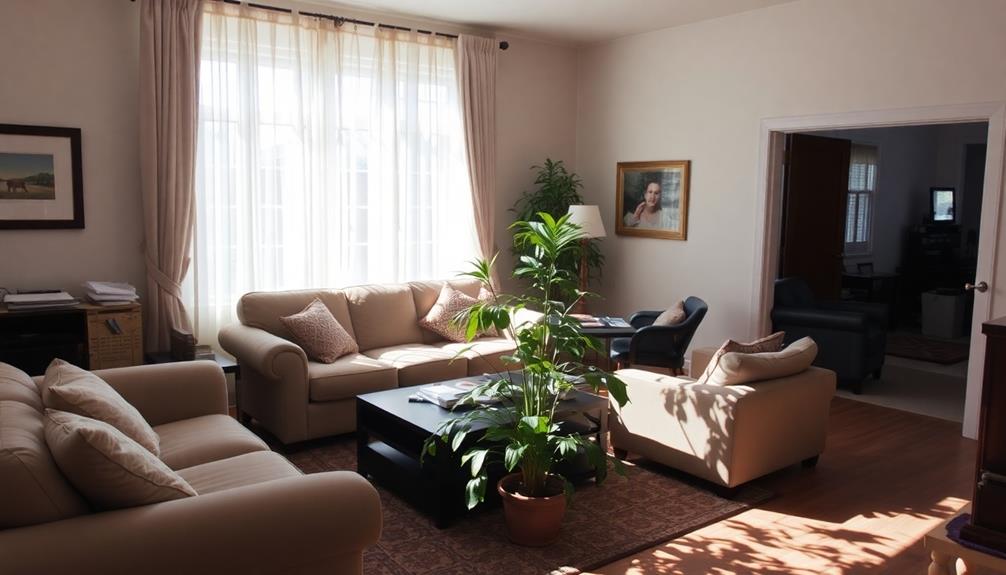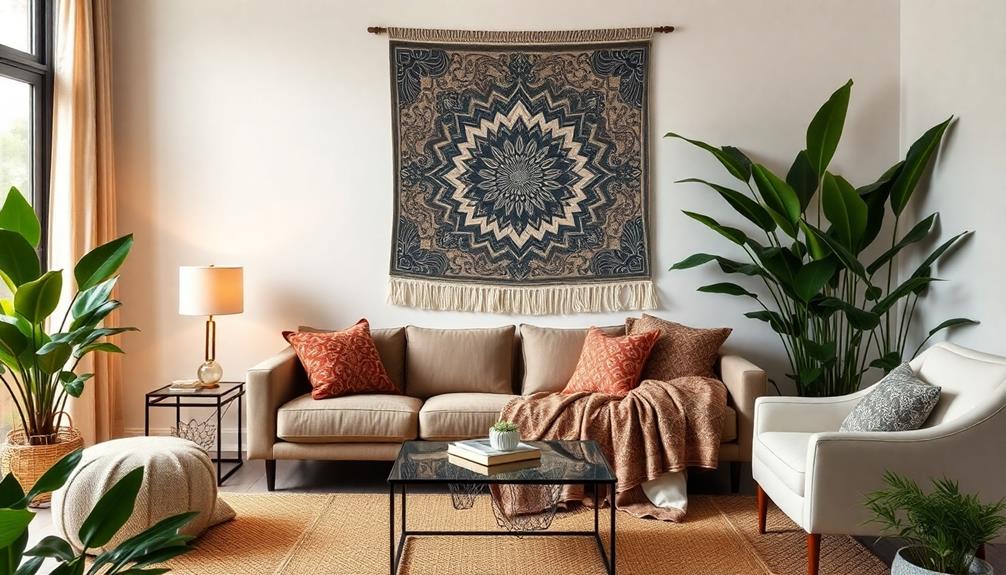You might be making common Feng Shui mistakes that disrupt the flow of positive energy in your home. Clutter can create chaos and block the essential qi your space needs. Poor lighting choices may leave areas feeling uncomfortable and anxious. Incorrect mirror placement reflects negative energy, while oversized furniture can overwhelm small rooms. Neglecting plants and symbols also dampens liveliness. In your bedroom, an improper layout can disturb your sleep, and unmaintained kitchens and bathrooms may attract negativity. By rethinking these aspects, you can enhance harmony in your home and create a more uplifting environment. There's much more to explore about this.
Key Takeaways
- Clutter disrupts energy flow, causing stress; regularly declutter your home for mental clarity and harmony.
- Incorrect mirror placement can reflect negative energy and clutter, leading to increased anxiety and confusion.
- Oversized furniture can create a cramped atmosphere; ensure furniture size and arrangement promote clear pathways and positive energy circulation.
- Poor lighting choices, like harsh overhead lights, can negatively affect mood; incorporate multiple light sources for a balanced environment.
- Unhealthy plants disrupt energy flow; maintain vibrant, suitable plants for a fresh atmosphere and positive energy contribution.
Clutter and Energy Blockages
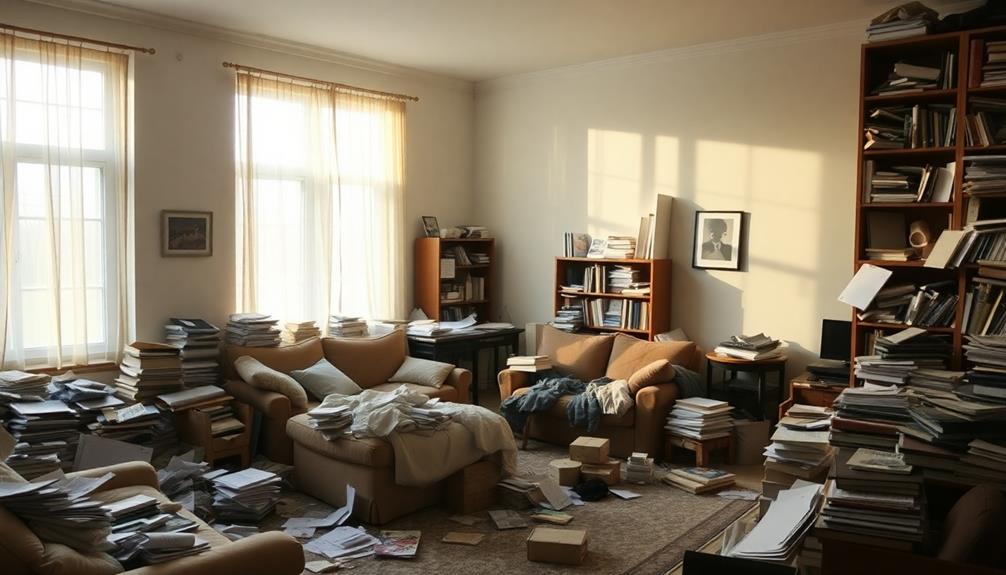
Clutter acts like a dam in the river of your home's energy, disrupting the flow of qi and leading to feelings of overwhelm and stress. When you hold onto items without purpose or keep broken belongings, you create significant energy blockages that deplete your home's liveliness.
This stagnant energy can weigh you down, making it difficult to focus or feel at ease in your space. Incorporating decorative elements like traditional artistry can also enhance the overall energy of your home while celebrating cultural heritage.
To maintain a vibrant and inviting atmosphere, regularly clearing tabletop surfaces, counters, and corners is crucial. By doing so, you promote positive energy flow and enhance mental clarity.
You don't have to tackle this alone; consider hiring a professional organizer to assist with decluttering projects. They can help you remove unnecessary items, making it easier to achieve a harmonious environment.
Don't forget about your entry areas! Managing shoes, bags, and coats guarantees clear pathways and invites positive energy into your home.
Poor Lighting Choices
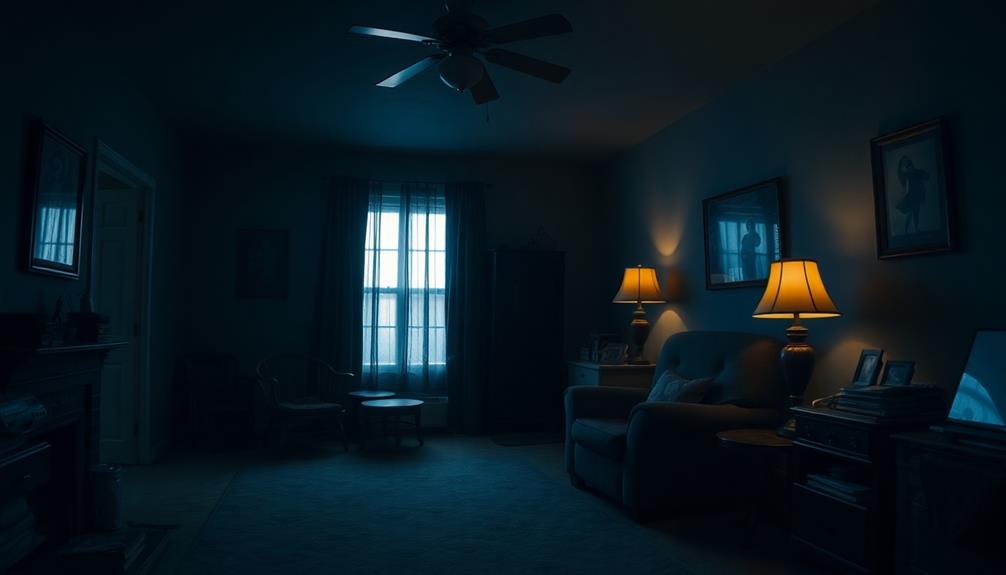
Your lighting choices can greatly impact your mood and overall energy in your home.
Relying on a single harsh overhead light can create discomfort, while incorporating layered light sources and maximizing natural light can uplift your space.
Impact on Mood
How can poor lighting choices impact your mood at home? Relying solely on dim or harsh lighting can drain your energy and lead to feelings of lethargy or anxiety. Conversely, bright and cheerful lighting enhances energy flow, greatly improving your overall mood and mental clarity.
| Lighting Type | Impact on Mood |
|---|---|
| Dim Lighting | Lowers energy, promotes lethargy |
| Harsh Lighting | Creates tension, increases anxiety |
| Bright Lighting | Elevates mood, enhances clarity |
To achieve good feng shui in your home, consider incorporating multiple light sources such as ambient, task, and accent lighting. This creates a balanced environment that fosters comfort and well-being. Don't forget about natural light! Keeping windows clean and unobstructed not only elevates your mood but also improves air quality, promoting ideal energy flow.
Lastly, consider using energy-efficient LED bulbs to enhance lighting quality. They can transform your home into a more uplifting and vibrant space. By making thoughtful lighting choices, you can create a positive atmosphere that truly supports your well-being and mood.
Layered Light Sources
Creating a harmonious home environment hinges not just on choosing the right fixtures, but also on layering light sources effectively.
Incorporating elements of Indonesian decorative pillows can introduce vibrant colors and intricate patterns that enhance your space while harmonizing with your lighting choices.
Poor lighting choices can disrupt the energy flow and diminish good qi in your space. To enhance your environment, consider the following layered lighting strategies:
- Ambient Lighting: Start with a general light source, like ceiling fixtures, to provide an even wash of light throughout the room.
- Task Lighting: Add focused light sources, such as desk lamps or reading lights, to illuminate specific areas where activities take place.
- Accent Lighting: Use spotlights or wall sconces to highlight artwork or architectural features, creating visual interest and depth.
- Energy-Efficient Bulbs: Opt for LED bulbs to improve lighting quality while boosting energy efficiency, ensuring your environment feels uplifting.
Natural Light Benefits
Natural light plays an essential role in enhancing both mood and energy levels within a home. When you allow sunlight to flood your space, you invite positive energy and good fortune into your life.
Incorporating elements of Balinese interior design can further enhance this effect, as it emphasizes open floor plans and natural materials that promote airflow and light. However, poor lighting choices, like heavy drapes or cluttered windows, can block this crucial resource, leaving you feeling lethargic and unmotivated.
To maximize natural light, keep your windows clean and unobstructed. This simple step boosts overall vitality and creates a more inviting atmosphere.
Additionally, consider incorporating multiple light sources in your rooms. A balanced mix of ambient, task, and accent lighting helps maintain positive energy flow throughout the space.
Watch out for dim or harsh lighting, as it can negatively impact your mental clarity and emotional well-being. Opt for soft, warm light bulbs to create a cozy environment that uplifts your spirits.
Inappropriate Mirror Placement
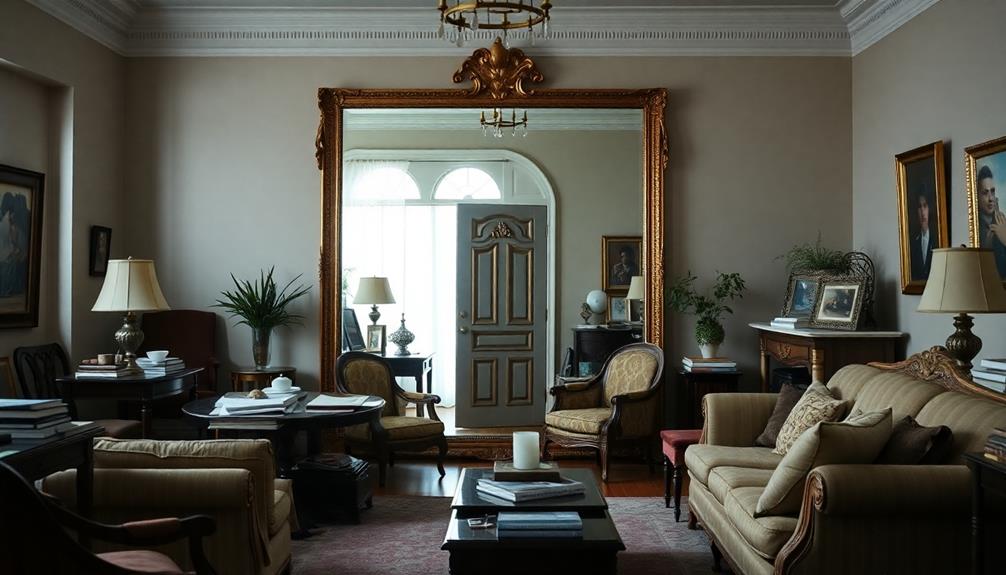
You mightn't realize it, but inappropriate mirror placement can reflect negative energy right back into your space.
For instance, in a Bali interior design style, mirrors should enhance the ambiance rather than disrupt it.
If you've got mirrors in your bedroom, they could be disrupting your sleep and creating a sense of chaos.
It's essential to understand how to position mirrors effectively to maintain a positive flow of energy in your home.
Reflecting Negative Energy
Positioned incorrectly, mirrors can inadvertently reflect negative energy throughout your home. When you place mirrors inappropriately, you disrupt the flow of positive energy, known as qi.
Here are some common pitfalls to avoid:
- Directly Opposite the Front Door: This positioning pushes positive energy away from your home, creating a barrier to good vibes.
- Reflecting Clutter: If your mirror reflects disarray, it amplifies chaotic energy, making your space feel more stressful.
- Facing Each Other: Mirrors facing each other create an endless loop of energy that can lead to confusion and imbalance.
- In Bedrooms: Excessive mirrors in bedrooms can disturb restful energy, impacting your sleep quality.
To enhance the energy flow, consider placing mirrors off to the side of entrances. Reflect uplifting views or natural light to invite positivity into your space.
If relocating a problematic mirror isn't possible, think about replacing it with artwork that resonates positively.
Overuse in Bedrooms
Mirrors in the bedroom can be a double-edged sword. While they can enhance light and space, overuse and inappropriate placement can disrupt your restful energy. If you place a mirror directly facing your bed, it reflects and amplifies energy, leading to restlessness and disturbed sleep. To guarantee a tranquil environment, consider these guidelines for mirror placement:
| Placement | Effect | Recommendation |
|---|---|---|
| Directly Facing Bed | Disrupts restful energy | Avoid this placement |
| Reflecting Clutter | Creates chaos | Keep mirrors clear of distractions |
| Overabundance of Mirrors | Causes emotional instability | Limit to one or two strategically placed mirrors |
| Low Light Areas | Reduces uplifting views | Use mirrors to enhance light |
| Incorrect Positioning | Invites negative energy | Position mirrors away from the bed |
Strategic placement is key. Aim for mirrors that uplift views and light without reflecting your bed. This approach fosters a calm and secure sleeping environment, helping you relax and rejuvenate. Remember, less can often be more when it comes to mirrors in bedrooms.
Furniture Size and Arrangement
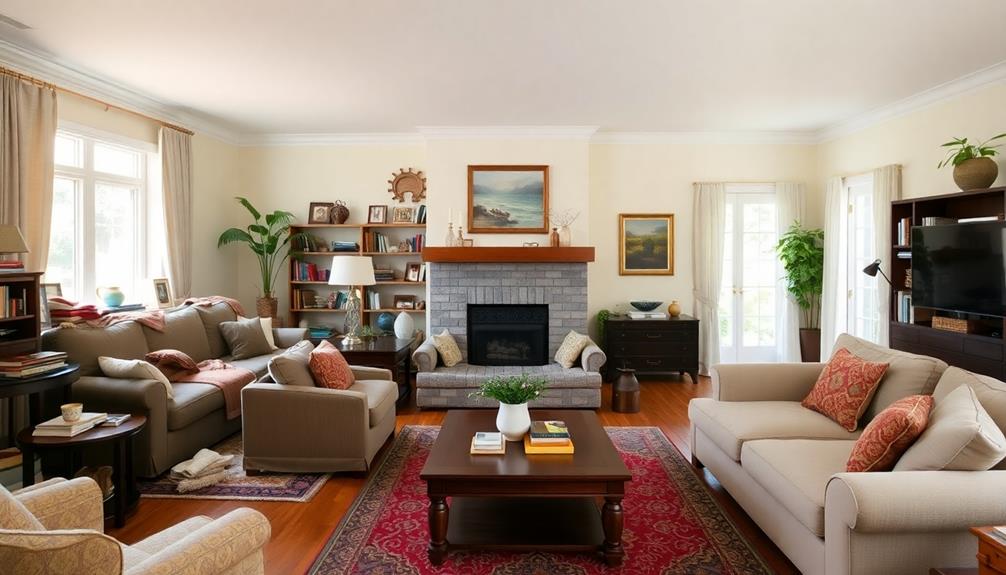
Proper furniture size and arrangement play an essential role in creating a harmonious living space. Oversized furniture can create a cramped atmosphere, blocking energy flow and making your home feel less inviting.
To enhance the flow and balance, consider these key tips:
- Choose the Right Size: Verify your furniture fits the space appropriately. Larger pieces can ground the area, while smaller items promote flexibility.
- Encourage Open Pathways: Arrange your furniture to facilitate movement. Clear pathways support positive energy circulation, while blocked routes can lead to stress.
- Adopt the Command Position: Position essential pieces, like sofas and beds, where you can see the doors. This promotes a sense of security and control.
- Foster Connection: Avoid lining furniture against walls. Instead, arrange seating to encourage conversation and connection among occupants.
Neglecting the Entryway
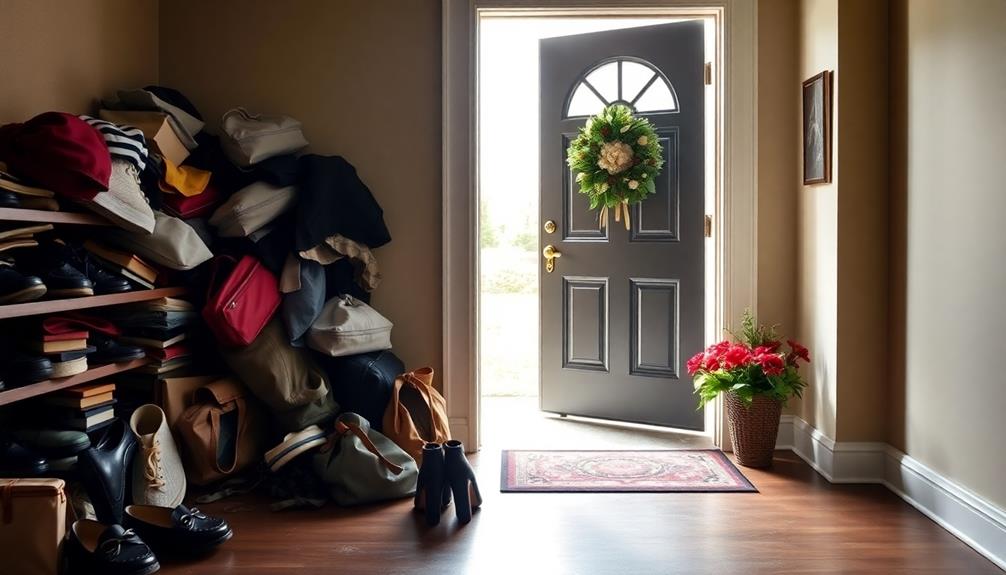
Your entryway plays a crucial role in setting the tone for your entire home, so keeping it clutter-free is essential for positive energy flow.
Incorporating elements of luxury tropical design aesthetics can enhance the space, making it more inviting and reflective of your personal style.
Make sure pathways are clear and consider adding welcoming decor elements that reflect your personality.
Clutter-Free Pathways
An inviting entryway sets the tone for your entire home, so neglecting it can block the flow of positive energy. To create a clutter-free entryway that promotes harmony, follow these essential tips:
1. Declutter Regularly: Make it a habit to assess your entryway weekly. Remove unnecessary items that can obstruct positive energy flow.
Incorporating elements of Indonesian cultural heritage can also enhance the ambiance.
2. Organize Essentials: Use baskets or decorative boxes to store shoes, keys, and mail. This keeps the space tidy and guarantees easy access to what you need.
3. Add Personal Touches: Incorporate plants or decorative elements like art or mirrors. These not only enhance the energy but also add a welcoming vibe.
Consider adding an Indonesian decor mask to bring a unique artistic expression that celebrates traditional craftsmanship.
4. Guarantee Good Lighting: A well-lit entryway feels more inviting. Use natural light if possible, or add warm lighting to create a cozy atmosphere.
Welcoming Decor Elements
A welcoming entryway is vital for creating a positive first impression in your home. If you're neglecting this space, you might be making common Feng Shui mistakes that block positive energy from flowing into your living areas.
Incorporating vibrant decor elements inspired by local culture, such as Indonesian wedding decor ideas, can further boost the energy of your entryway. A clutter-free, well-lit entryway greatly enhances energy flow and sets the tone for your home.
As a Feng Shui Consultant would advise, incorporating welcoming decor elements like meaningful artwork or vibrant plants can warm up the space. These personal touches not only invite good vibes but also promote a positive energy exchange.
Regular maintenance is important, too. Guarantee clear pathways and functional doors to facilitate the flow of energy. A tidy and vibrant entryway encourages a welcoming vibe for both you and your guests.
Avoid heavy drapes or dark colors that can stifle energy; instead, use bright lighting and light colors to uplift the space.
By paying attention to your entryway, you're not just enhancing aesthetics; you're also cultivating a harmonious atmosphere that resonates throughout your home.
Overwhelming Color Schemes
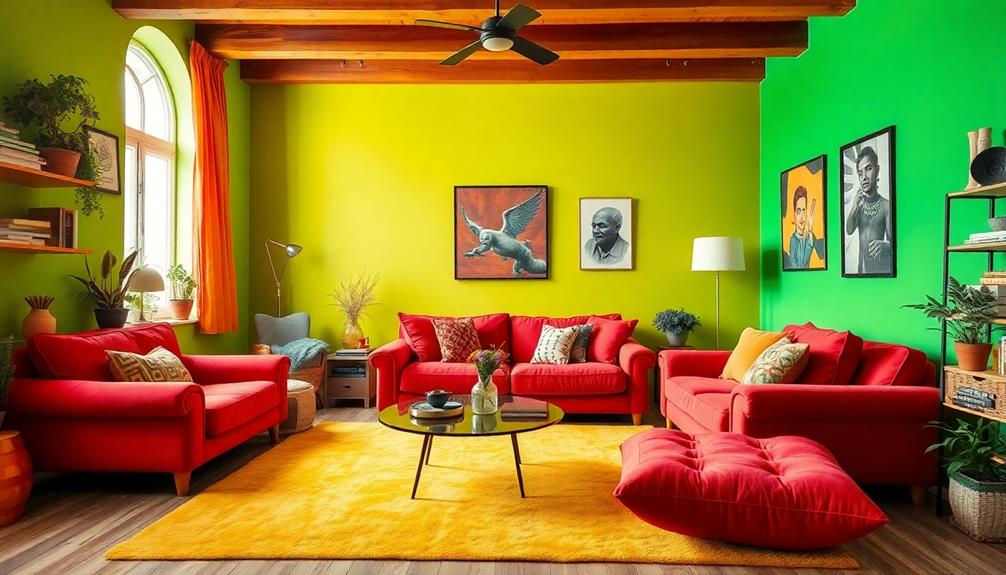
Overwhelming color schemes can greatly disrupt the balance and harmony within your home, leading to feelings of stress and anxiety.
In traditional Indonesian housing, for example, the use of color is often symbolic and reflects cultural values, contributing to a sense of community and identity.
To create an environment that fosters positive energy flow, it's crucial to follow some basic Feng Shui rules regarding color selection, much like the distinct architectural styles found in traditional homes.
Here are four tips to help you avoid overwhelming color schemes:
- Choose Light Colors: Opt for pastel blues, greens, and whites to promote tranquility and calmness in your space.
- Balance Your Palette: Incorporate a mix of warm and cool colors. Warm colors add vibrancy, while cool colors provide soothing effects.
- Use Neutrals Wisely: Strategically integrate neutral tones to balance bold colors. This prevents any single color from dominating the space and contributing to stress.
- Reassess Regularly: Regularly evaluate your color choices to validate they align with your personal values and experiences, maintaining a harmonious atmosphere.
Unhealthy or Dead Plants
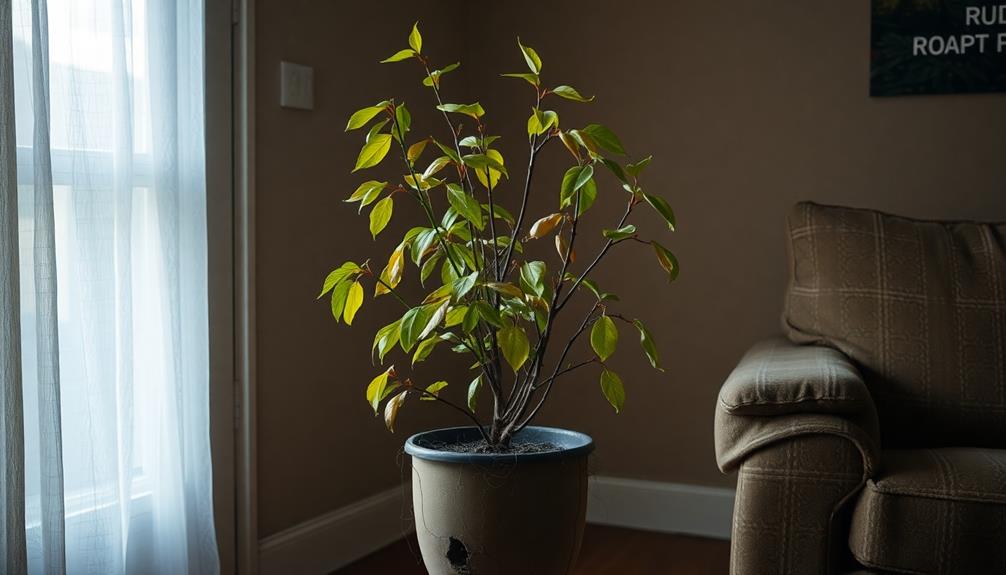
Unhealthy or dead plants can greatly disrupt the energy flow in your home, creating an environment that feels stagnant and lifeless.
These dying plants symbolize drained liveliness, which negatively impacts the overall atmosphere. You mightn't realize it, but having unhealthy plants around can evoke feelings of neglect and loss, contributing to emotional distress and affecting your mental clarity.
To enhance your home's energy, consider incorporating elements of tropical villa plans that emphasize outdoor living areas filled with lush, vibrant plants that thrive in natural light.
Regular maintenance is essential. By removing dead plants and ensuring healthy growth, you'll foster fresh energy and enhance the air quality in your space.
Consider incorporating a variety of thriving plants; they not only visually enrich your home but also promote a positive energy flow and serve as natural air purifiers.
It's important to choose plants suitable for your environment. Unhealthy plants may indicate poor lighting or care conditions, further disrupting the energy balance in your home.
Ignoring Feng Shui Symbols
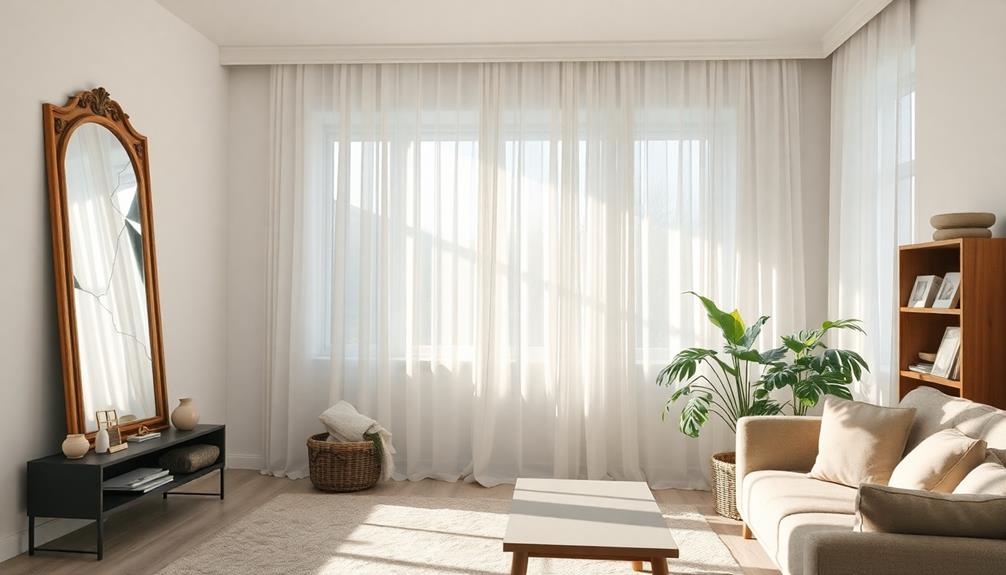
Many homeowners overlook the importance of Feng Shui symbols, missing out on their potential to enhance happiness, wealth, and luck.
Incorporating unique decor elements, such as Indonesian decor masks, can also serve as powerful symbols that not only beautify your space but also resonate with cultural importance.
These powerful tools can transform your space, but only if you use them correctly. Ignoring Feng Shui symbols can lead to energy imbalances, especially if you don't place them in key areas like the Wealth Corner.
Here are four common mistakes to avoid:
- Neglecting Personal Resonance: Choose symbols that resonate with you personally; their effectiveness increases when they hold personal importance.
- Wrong Placement: Misunderstanding where to place symbols can diminish their intended effects, so verify you align them with their purpose.
- Forgetting to Update: Reassess your Feng Shui symbols regularly to reflect personal growth and life changes, verifying a continued harmonious energy flow.
- Ignoring Key Areas: Don't overlook important spaces in your home, particularly the Wealth Corner, where symbols can greatly boost your financial prospects.
Incorrect Bedroom Layout
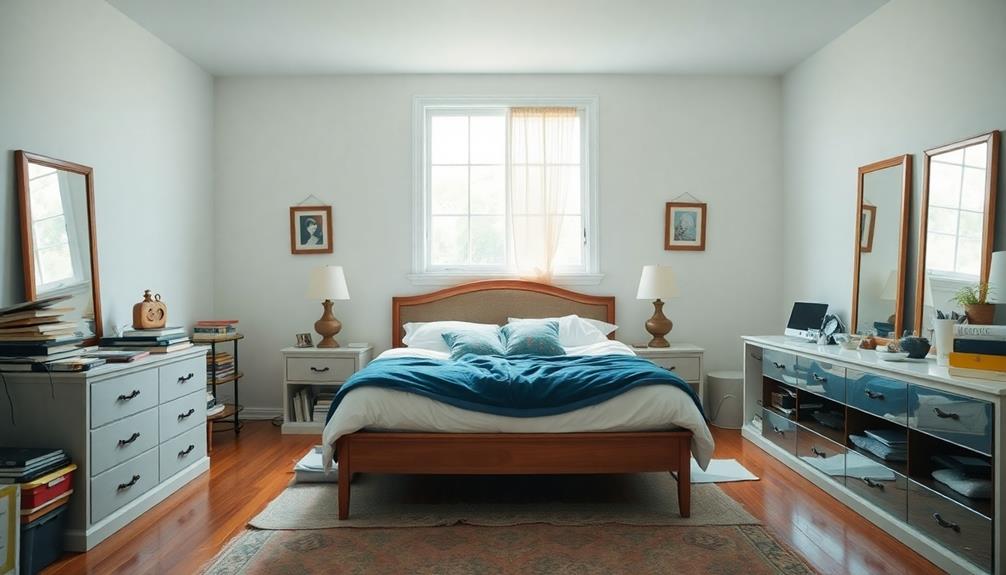
When arranging your bedroom layout, positioning your bed correctly is essential for fostering a peaceful environment. Avoid placing your bed directly in line with the door, as this can create feelings of vulnerability and negative energy. Instead, aim for the command position: a solid wall behind your bed and a clear view of the door. This setup enhances restful energy and boosts your overall well-being.
Additionally, keeping your bedroom a clutter-free zone is vital. Clutter can lead to stagnant qi, negatively affecting your sleep and personal rejuvenation. Make sure that the area under your bed is clear, as storing items there disrupts energy flow and can result in restless nights.
Be mindful of mirrors in the bedroom; too many can create chaotic energy and disturb relaxation. Instead, opt for calming artwork that promotes a serene atmosphere.
Disregarding Kitchen and Bathroom Care
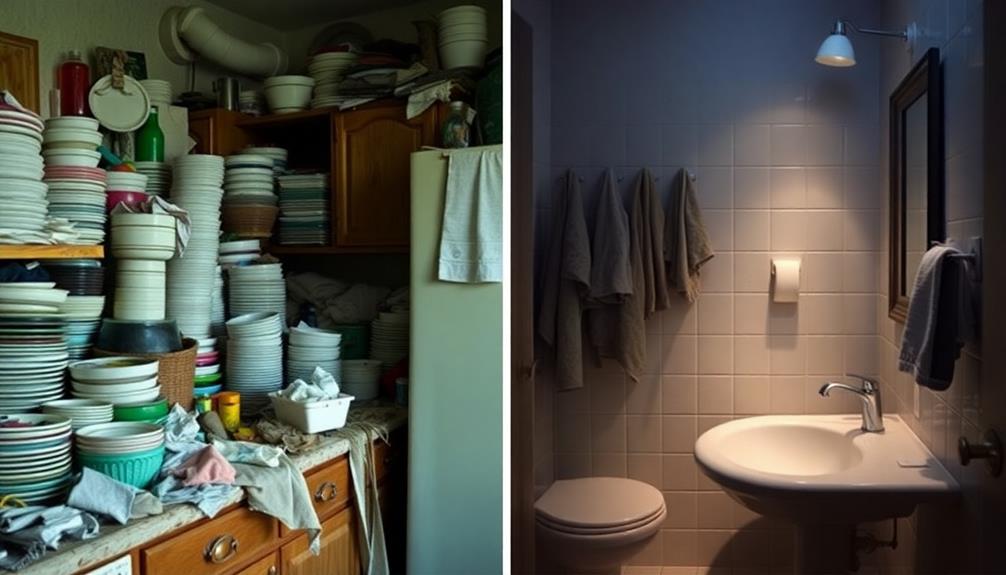
Your home's energy extends beyond the bedroom, making kitchen and bathroom care just as important. Neglecting these areas can disrupt your energy flow and impact your overall well-being.
Here are four essential practices to keep in mind:
- Maintain a Clean Stove: Regular kitchen maintenance, like keeping your stove clean and organized, attracts prosperity and abundance into your home.
- Remove Expired Food: Frequently check your pantry and fridge, and remove any expired food. This promotes cleanliness and guarantees the energy in your kitchen remains vibrant and fresh.
- Keep Toilet Seats Closed: In the bathroom, always keep the toilet seat closed. This simple act symbolizes the retention of good fortune and can greatly enhance your energy flow.
- Guarantee Adequate Lighting: Optimize lighting in both spaces. Well-lit kitchens and bathrooms promote positivity, while dim or harsh lighting can create negative energy and affect your mood.
Frequently Asked Questions
What Is Considered Bad Feng Shui in a House?
Bad feng shui in a house includes cluttered spaces, improper bed placement, mirrors facing the front door, items stored under the bed, and neglected entryways. These factors can disrupt energy flow and affect your well-being.
What Colors Should Be Avoided in Feng Shui?
Have you considered how color affects your space? In Feng Shui, avoid heavy dark colors and overly bright hues, as they can disrupt energy flow. Instead, opt for balanced shades that promote harmony and positive emotions.
What Are the Designs to Avoid According to Feng Shui?
When considering designs to avoid according to feng shui, steer clear of oversized furniture, dark color schemes, cluttered spaces, and mirrors facing the front door. These can disrupt energy flow and create an unwelcoming atmosphere.
What Are the Feng Shui Rules for a House?
To enhance your home's energy, keep your entryway inviting, place furniture for visibility and support, avoid mirrors facing the door, declutter regularly, and choose light colors to create a tranquil atmosphere.
Conclusion
So, are you ready to transform your space? By avoiding these common feng shui mistakes, you can invite positive energy and create a harmonious home. Remember, each choice you make in your environment shapes your well-being. Don't let clutter weigh you down or mirrors mislead you—embrace the power of thoughtful arrangement and care. Your home should be a sanctuary, not a source of stress. Start today, and watch your life flourish in ways you never imagined!
